September 26, 2025

The article highlights the burgeoning demand for unique job roles in behavioral analysis within the healthcare sector, emphasizing ten distinct positions that cater to diverse needs, from patient care to community wellness. This demand is largely driven by the increasing recognition of the importance of Applied Behavior Analysis (ABA) techniques in enhancing mental health outcomes and operational efficiency in healthcare settings.
As the need for Board Certified Behavior Analysts (BCBAs) continues to grow, healthcare employers must consider how to effectively recruit these essential professionals. The benefits of utilizing Hire ABA for recruitment are significant, offering a reliable platform to connect with qualified candidates.
Reflect on your current hiring challenges: are you equipped to meet the rising demand for behavioral analysts? Hire ABA can provide the solutions you need to address these issues effectively.
With a clear focus on the unique needs of the healthcare sector, this article serves as a crucial resource for understanding the roles available and the impact they can have on improving care and outcomes.
As the landscape of healthcare evolves, the demand for specialized roles in behavioral analysis is surging. Projections indicate a staggering 25% increase in the need for Board Certified Behavior Analysts (BCBAs) by 2026. This article explores ten unique behavioral analysis jobs that not only address the growing needs of healthcare employers but also highlight the transformative impact these professionals have on patient care and community well-being. With such rapid growth, how can healthcare organizations effectively navigate the competitive job market to secure the best talent? Exploring innovative recruitment strategies and understanding the essential roles these analysts play may hold the key to enhancing both their workforce and the quality of care provided.
The demand for Board Certified Analysts (BCBAs) is projected to surge by an impressive 25% by 2026. Hire ABA functions as a dedicated recruitment platform that connects BCBAs with top behavioral analysis jobs in Applied Behavior Analysis (ABA) therapy, thereby streamlining the job matching process. This efficiency allows healthcare employers to swiftly identify qualified candidates tailored to their specific requirements. Notably, job postings for behavioral analysis jobs, particularly for BCBAs, rose by 58% from 2023 to 2024, underscoring the competitive nature of the market.
By focusing on both efficiency and support, Hire ABA enhances the hiring experience, ultimately improving patient care and operational success. Consider the case studies, such as Touro College's program, which demonstrate that graduates achieve over 90% job placement rates within six months. This statistic underscores the effectiveness of targeted recruitment strategies for behavioral analysis jobs in the ABA field. Furthermore, the average salaries for BCBAs can reach up to $110,000, illustrating how our recruitment process contributes to the financial benefits of hiring qualified professionals.
As healthcare employers increasingly recognize the importance of specialized recruitment platforms, the impact on hiring efficiency becomes evident. Are you prepared to enhance your hiring process and promote a more adaptable and skilled workforce in mental wellness? With Hire ABA, you can take the next step towards achieving your recruitment goals.
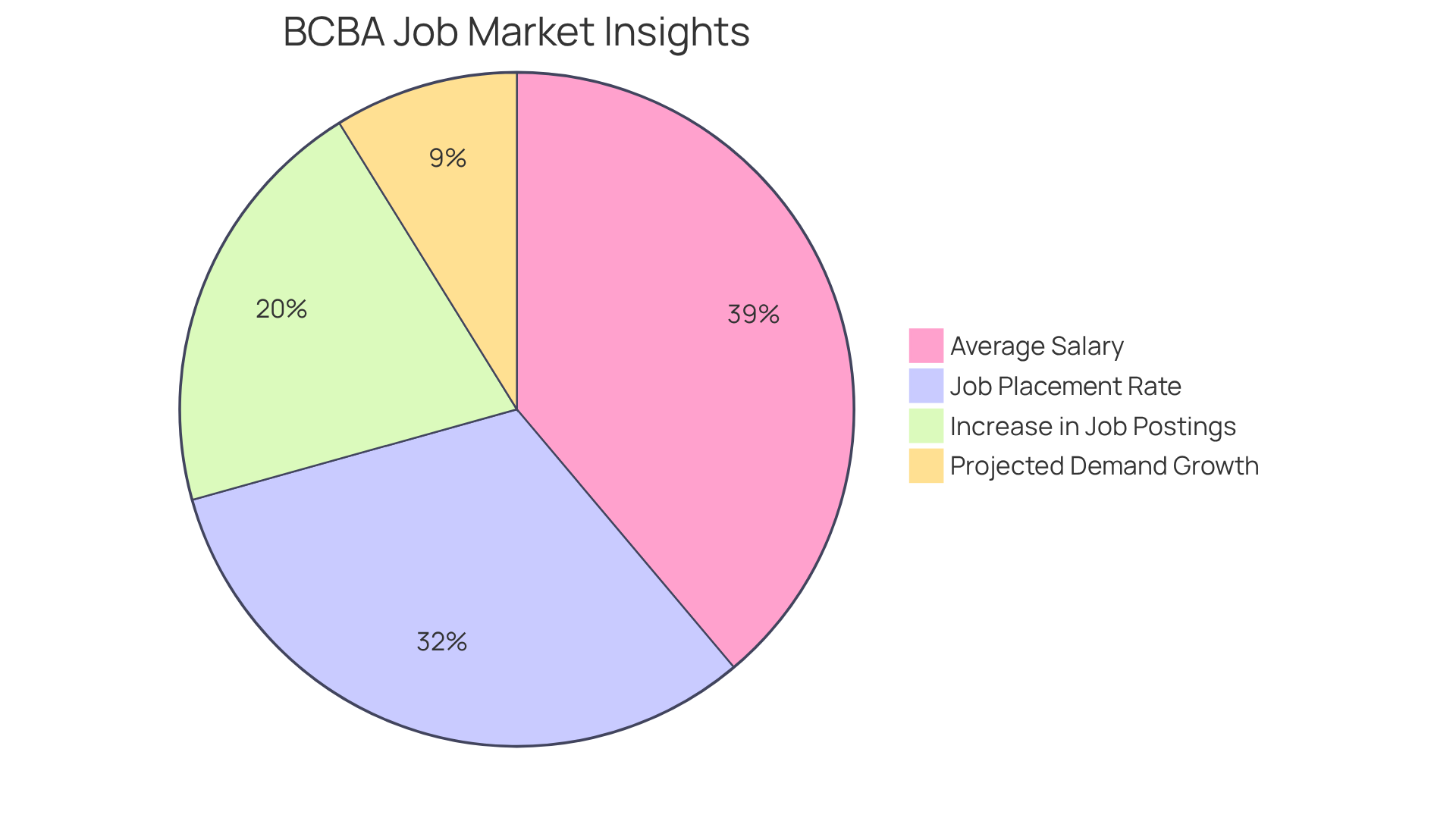
Behavioral Gerontologists play a pivotal role in addressing the complex needs of older adults, particularly those grappling with dementia, depression, and anxiety. With one in four older adults facing mental health challenges, the demand for skilled professionals in this field is undeniable. By employing Applied Behavior Analysis (ABA) techniques, these experts create tailored interventions that significantly enhance the well-being of elderly patients. Their work not only addresses behavioral challenges but also elevates the overall quality of care and patient satisfaction.
Successful interventions have shown that structured activities and personalized prompts lead to improved engagement and mood among older adults, underscoring the effectiveness of ABA techniques in this demographic. As the population of older adults continues to expand, healthcare employers must recognize the invaluable contributions of Behavioral Gerontologists who are engaged in behavioral analysis jobs. They should explore emerging opportunities in behavioral analysis jobs, such as leadership roles and flexible working conditions, to attract and retain these essential professionals.
Are you facing challenges in hiring qualified Behavioral Gerontologists? Consider how the right recruitment strategies can address these issues and ensure high-quality care in your organization. The expertise of Behavioral Gerontologists is not just beneficial; it is crucial for enhancing the mental health landscape of older adults.
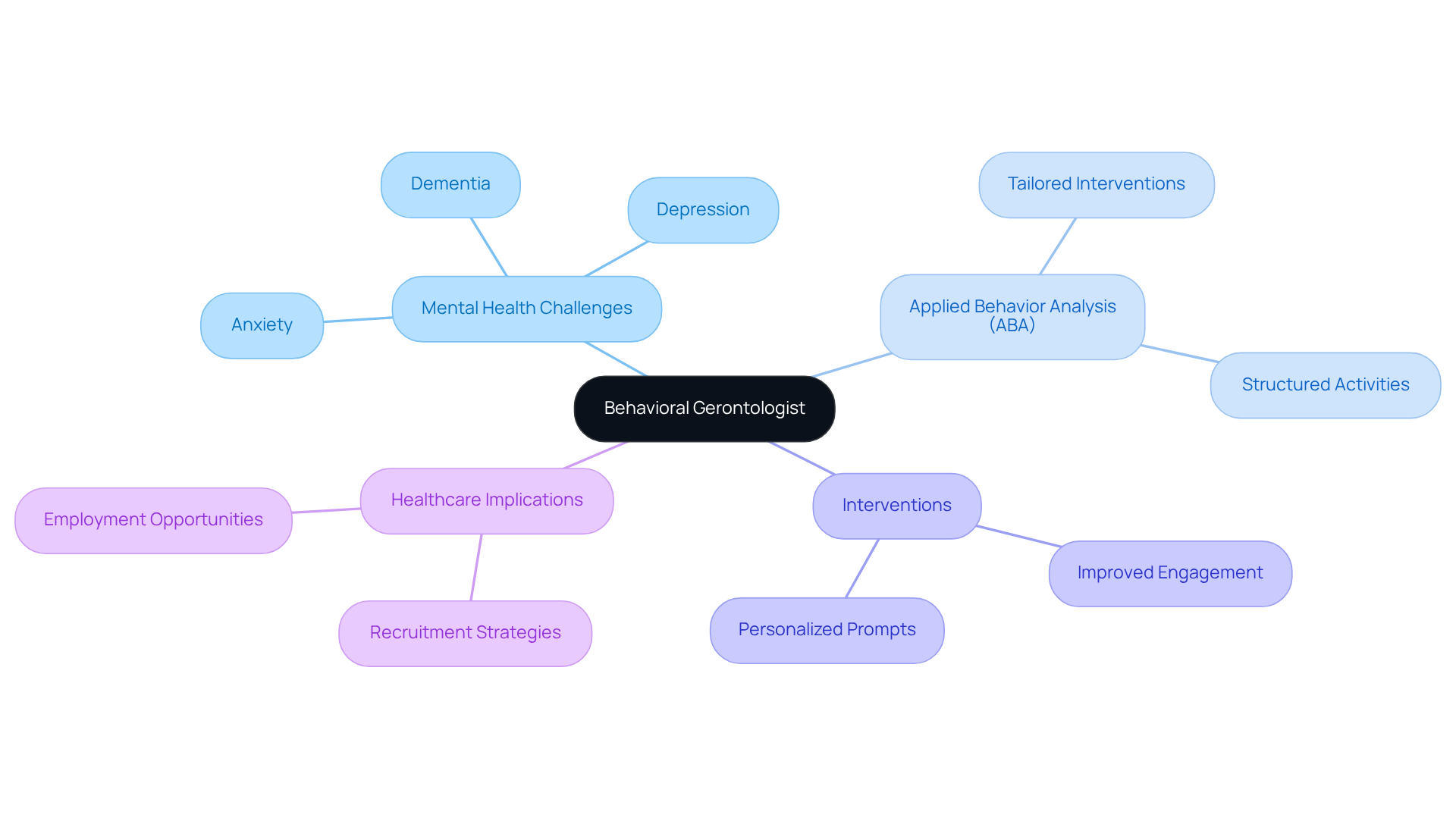
Organizational Dynamics Managers play a crucial role in enhancing workplace interactions through the application of Applied Conduct Analysis (ACA) principles. These professionals critically evaluate employee behavior, design targeted training programs, and implement effective strategies that cultivate a positive organizational culture.
In a competitive healthcare landscape, where turnover rates can reach as high as 20.7%, prioritizing behavior modification is essential for boosting employee engagement. Research shows that organizations that emphasize employee engagement experience measurable improvements in both performance and retention.
Furthermore, successful behavior modification strategies foster a motivated workforce, significantly reducing turnover costs, which can average between six and nine months of an employee's annual salary. Industry leaders underscore the importance of creating environments where employees feel valued and supported, aligning with the principles of ABA to drive organizational success.
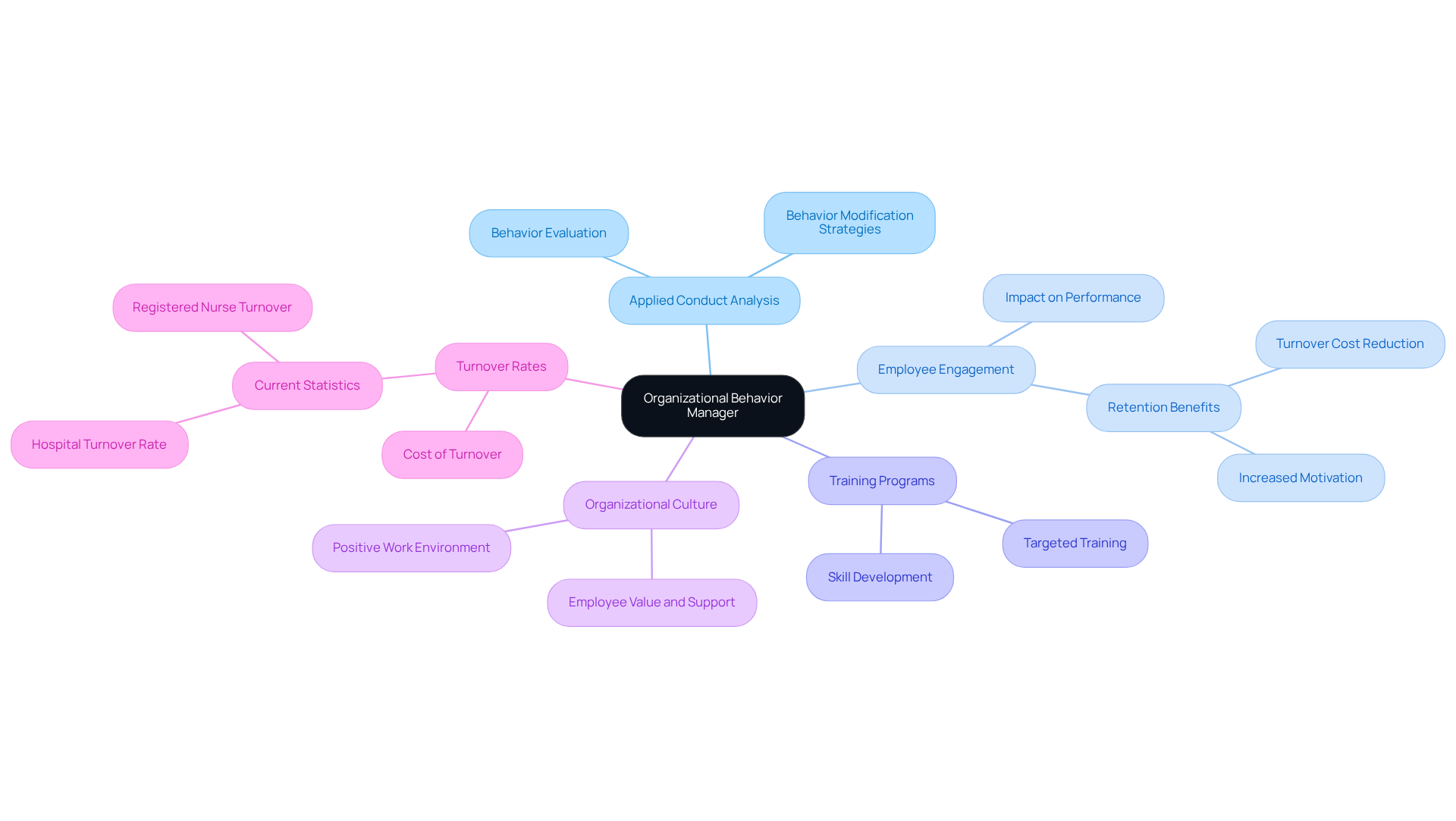
Animal Trainers utilize ABA techniques to modify and enhance animal behavior, focusing on positive reinforcement and behavior shaping. This role is crucial in environments such as zoos, aquariums, and therapy programs, where animals are trained for specific tasks or behaviors.
Have you considered how understanding animal behavior through the lens of ABA can transform your training programs? By applying these techniques, trainers can create effective programs that not only improve animal welfare but also facilitate meaningful human-animal interactions.
In an era where the demand for skilled trainers is rising, leveraging ABA methods is essential for optimal outcomes.
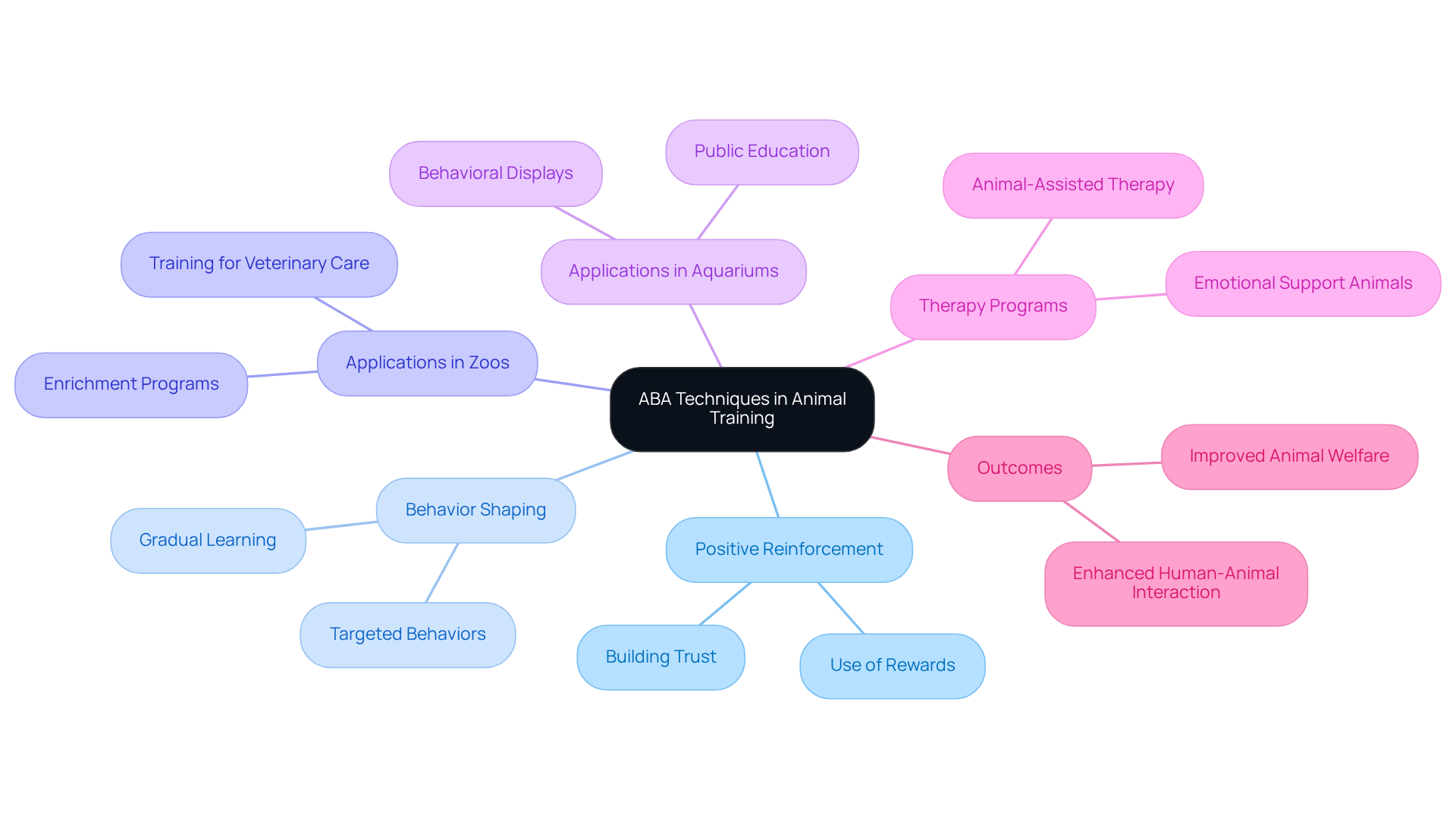
Forensic Analysts play a pivotal role in applying ABA principles to scrutinize criminal actions and support legal cases. They assess offenders, deliver expert testimony, and construct profiles that aid law enforcement in deciphering criminal motives. This work is crucial in bridging psychology and the legal system, as it ensures that insights into behavior significantly contribute to justice and rehabilitation.
Consider the impact of their expertise: by evaluating offenders and providing critical insights, forensic analysts not only support the judicial process but also foster a deeper understanding of criminal behavior. Their contributions are essential for developing effective rehabilitation strategies, ultimately enhancing public safety.
As we reflect on the complexities of criminal behavior, it's clear that the intersection of psychology and law is vital. Forensic Analysts are at the forefront of this field, ensuring that psychological insights are effectively integrated into legal practices, thereby promoting a more just society.

Mental Health Consultants are essential in enhancing patient care through the application of Applied Behavior Analysis (ABA) techniques across various healthcare environments. These professionals collaborate with healthcare providers to design and implement interventions that effectively address mental health challenges. By emphasizing evidence-based practices, they not only elevate the quality of care but also significantly contribute to positive patient outcomes.
Notably, research demonstrates that early and intensive ABA interventions can yield considerable advancements in cognitive, language, and daily living skills. This underscores the critical role these consultants play in the healthcare sector. Their proficiency in customizing interventions to cater to individual patient needs guarantees that treatment plans are both effective and aligned with best practices.
Consequently, they are indispensable in promoting a comprehensive approach to patient care.
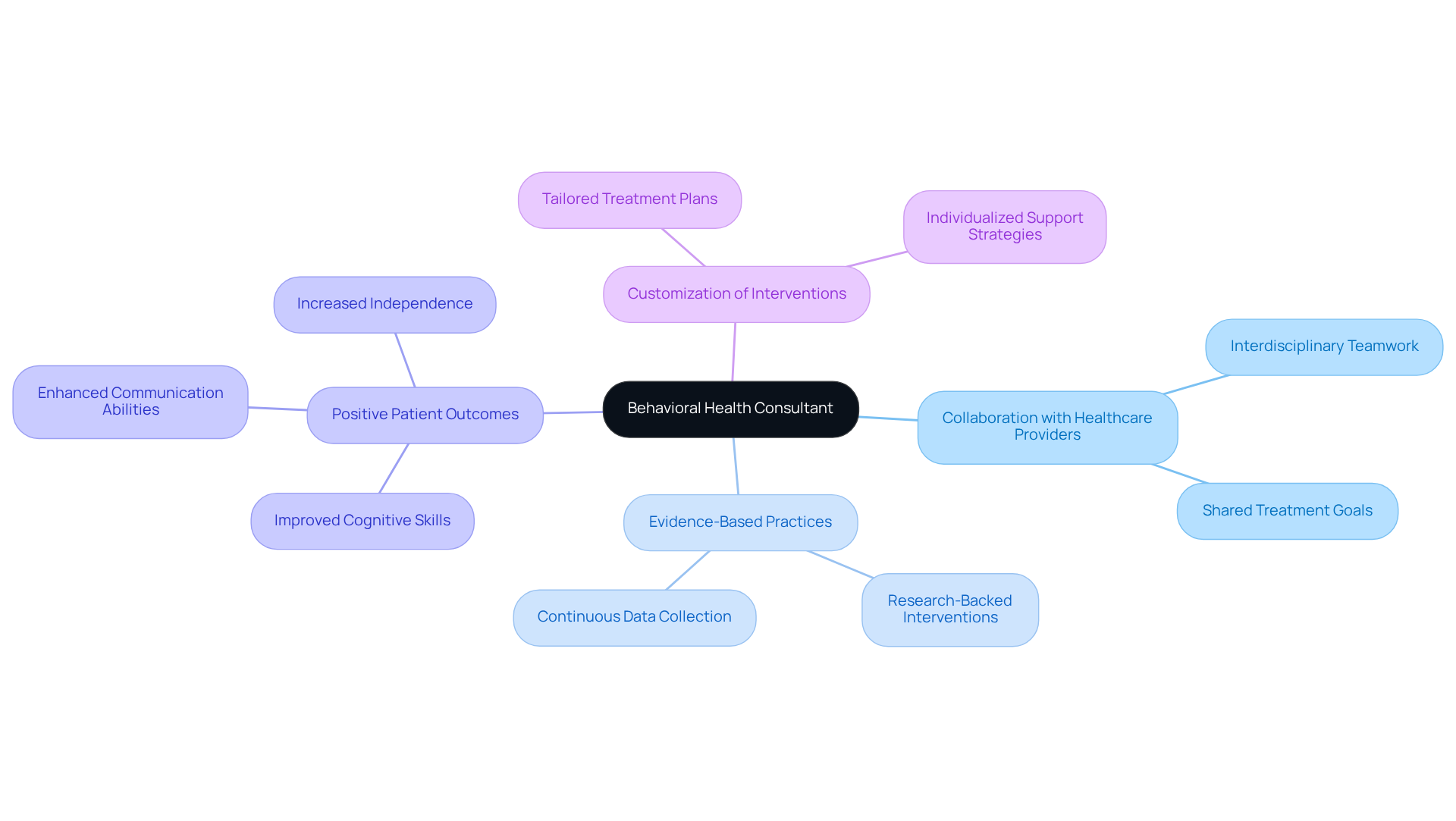
School Analysts are pivotal in identifying and addressing conduct challenges faced by students. They collaborate with educators, parents, and other professionals to develop individualized behavior intervention plans (BIPs) tailored specifically to each student's needs. Research underscores the necessity of well-crafted BIPs for fostering positive behavior and enhancing academic success. Notably, interventions grounded in Functional Behavior Assessment (FBA) data are 2.5 times more likely to be effective than those without this foundation. Furthermore, BIPs that utilize multi-source data collection have a 65% higher likelihood of resulting in significant behavioral improvements. By employing ABA techniques, these analysts cultivate supportive learning environments that not only promote academic achievement but also enhance social interactions. Classrooms that implement comprehensive prevention strategies experience a 50% reduction in challenging behaviors when compared to those that primarily rely on reactive approaches. This highlights the critical importance of proactive strategies in educational settings. As educators emphasize, effectively addressing conduct challenges is essential for fostering an inclusive and conducive learning atmosphere. As one BCBA® aptly stated, "As a BCBA®, you have the power to make a real difference in the lives of students and educators.
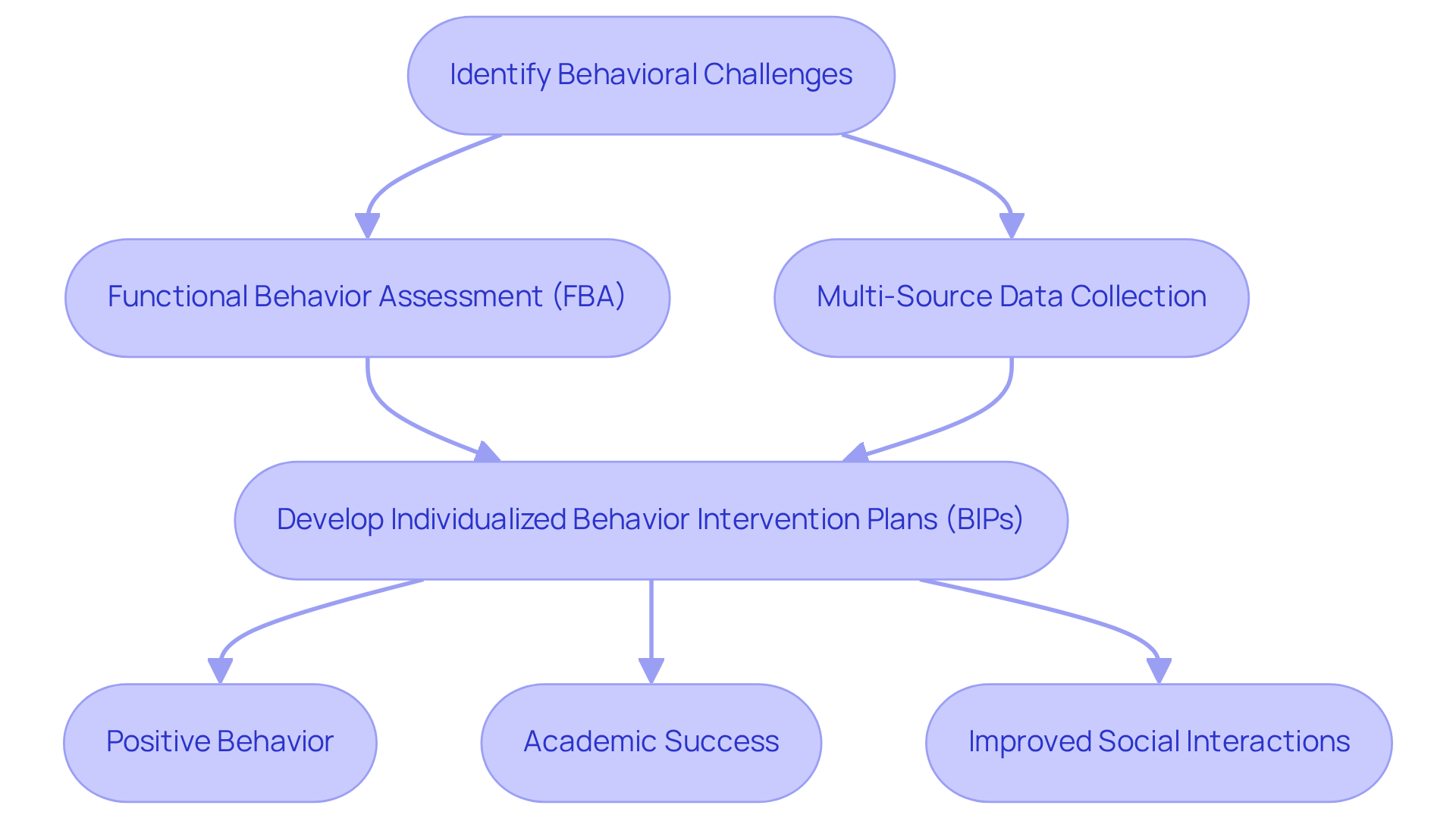
Community Behavior Analysts play a vital role in enhancing community well-being by leveraging the principles of Applied Behavior Analysis (ABA). With a focus on comprehensive evaluations, they assess community needs and develop targeted initiatives to address conduct-related issues. By prioritizing prevention and education, these professionals significantly impact public wellness outcomes. Notably, research indicates that effective community programs can lead to substantial improvements in mental well-being, with 21.8% of U.S. children facing mental health challenges benefiting from such initiatives. Moreover, integrating ABA principles into community programs fosters healthier, more resilient environments, ultimately reducing the prevalence of mental disorders among children.
Expert insights highlight the importance of tailored interventions that account for demographic disparities, ensuring all community members receive necessary support. This approach not only addresses pressing challenges but also contributes to the long-term well-being and stability of the communities they serve.
Are you considering how your community can benefit from such expertise? Community Behavior Analysts are equipped to tackle these urgent issues, paving the way for a healthier future.
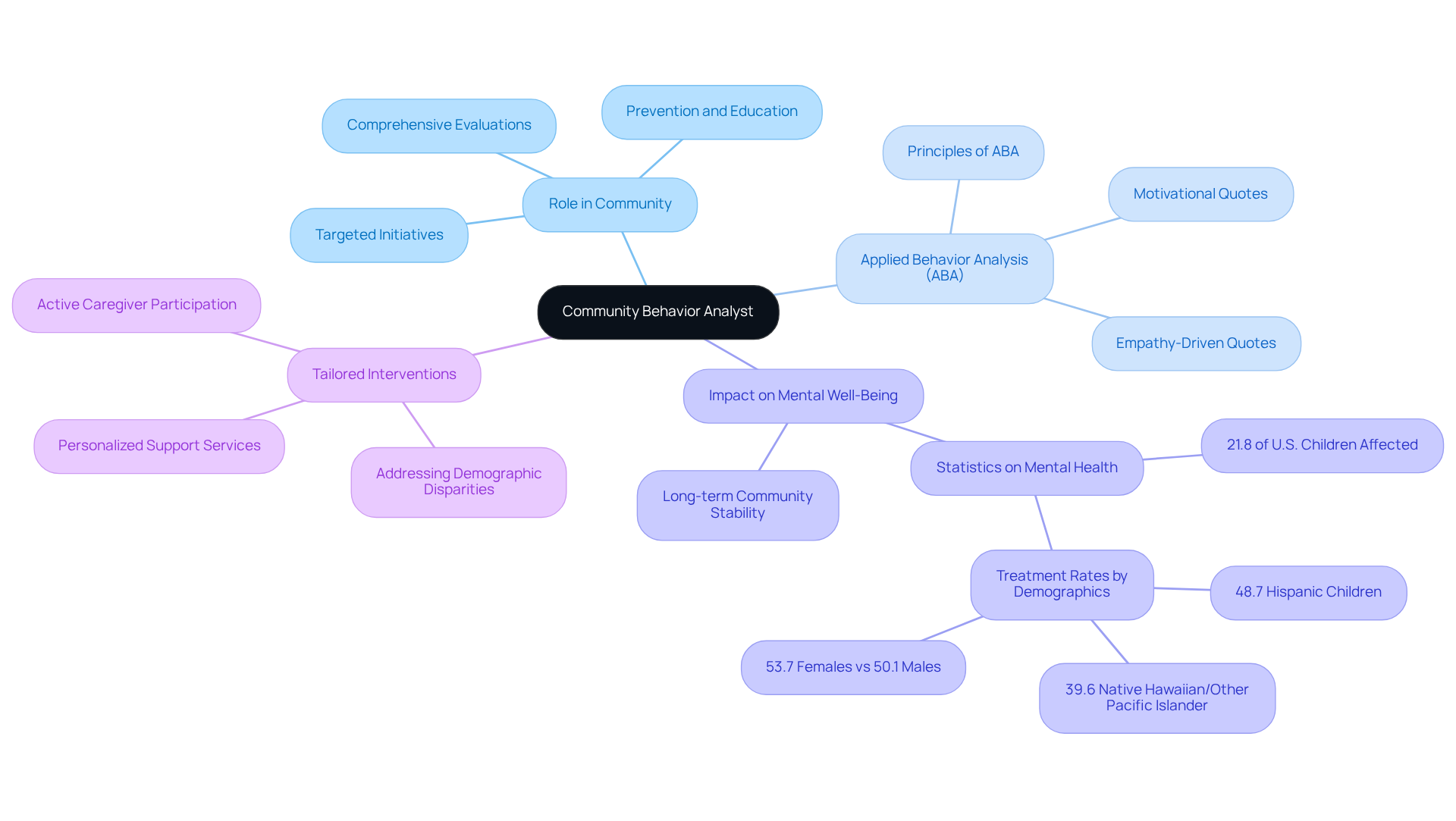
Data Analysts play a pivotal role in understanding and enhancing health interventions by analyzing information from diverse sources, such as clinical assessments and treatment outcomes. Their expertise in behavioral analysis jobs enables organizations to recognize conduct patterns and trends, which are crucial for guiding effective intervention strategies. By utilizing data analysis, these experts empower healthcare providers to make knowledgeable choices that enhance the efficiency of treatment programs and ultimately improve patient care.
Current trends indicate a growing reliance on data-driven approaches, with evidence-based practices ensuring that interventions are tailored to meet individual client needs. As the demand for behavioral analysis jobs in mental wellness continues to rise, the integration of technology and data science is becoming progressively essential in shaping successful treatment outcomes.
Ongoing data collection is critical in individualizing and modifying each child's ABA therapy plan to help them thrive. Furthermore, hybrid ABA treatment models have demonstrated a 9.7% improvement in goal achievement rates, illustrating the effectiveness of data-driven approaches.
Ethical considerations in data use are paramount, as behavior analysts involved in behavioral analysis jobs must navigate the responsibilities associated with data analytics to ensure client well-being.
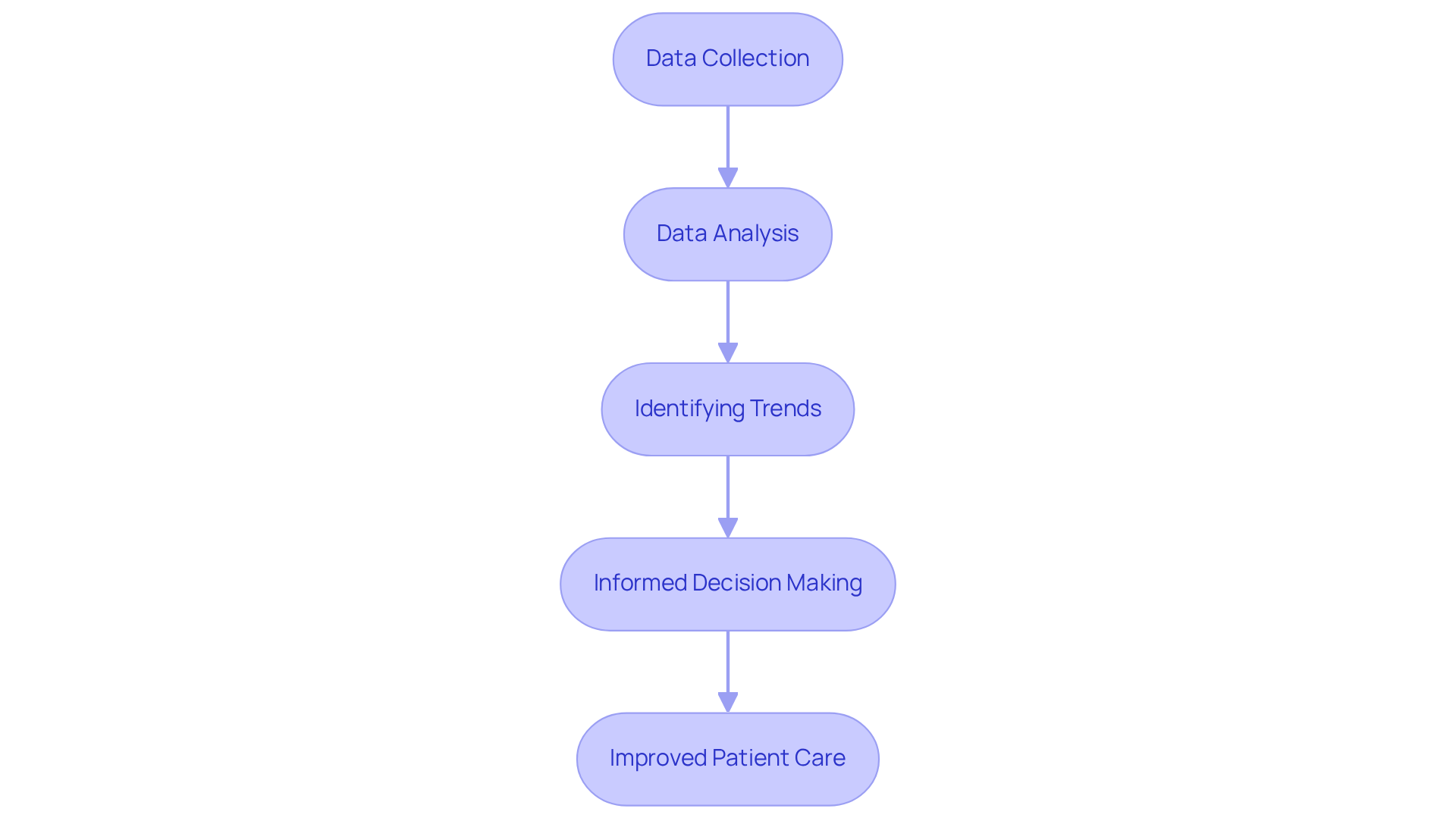
Mental Well-being Behavior Analysts are increasingly in demand, with projections indicating a 25% rise in the need for Board Certified Behavior Analysts (BCBAs) over the next five years. This surge highlights the critical role that these experts play in addressing mental well-being challenges such as anxiety, depression, and trauma. Utilizing Applied Behavior Analysis (ABA) techniques, they create and execute customized treatment plans that incorporate effective psychological strategies.
The integration of ABA into psychological practices not only enhances the effectiveness of interventions but also empowers patients to achieve their therapeutic goals. Current trends reveal a growing recognition of ABA's significance in mental wellness, with data demonstrating that structured approaches can lead to substantial improvements in patient outcomes.
As the demand for behavioral analysis jobs escalates, new opportunities arise, such as:
This evolution allows professionals to positively impact more lives while advancing their careers. Specialists in the field advocate for the standardization of ABA techniques in mental wellness treatment, underscoring their effectiveness in fostering resilience and promoting positive behavioral changes.
With the market for innovative mental health solutions expanding, Mental Health Behavior Analysts are at the forefront of delivering comprehensive care tailored to the diverse needs of patients. Are you facing challenges in hiring qualified professionals? Consider exploring the exciting career opportunities in behavioral analysis jobs by submitting your resume and staying informed about the latest openings. Your next step towards enhancing your team’s capabilities starts here.
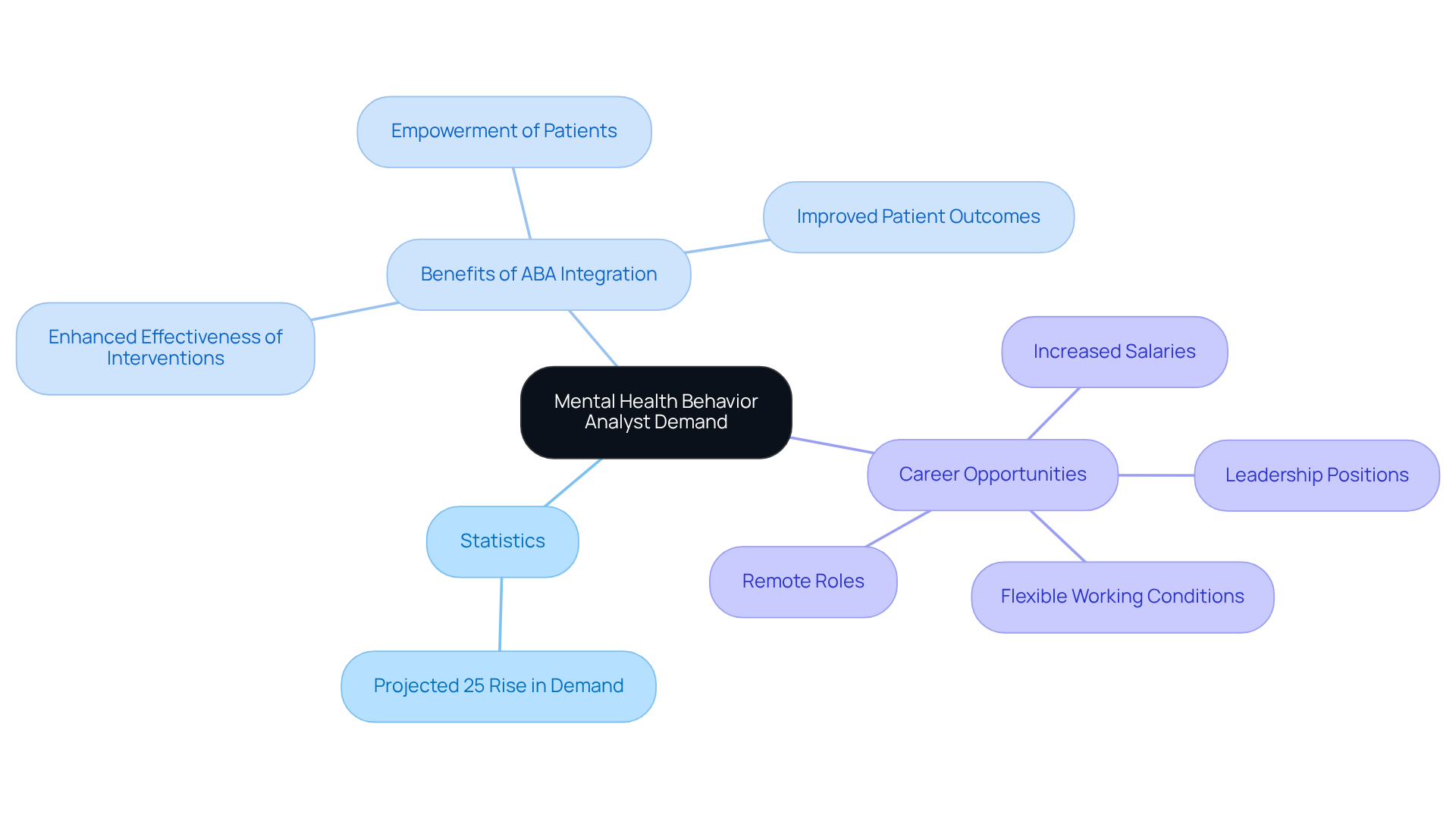
The landscape of healthcare is evolving dramatically, with a staggering demand for Board Certified Behavior Analysts (BCBAs) and other specialized roles. As mental health challenges rise, the need for effective interventions becomes paramount. This article highlights ten critical roles within the field, showcasing how professionals like Behavioral Gerontologists and Forensic Behavior Analysts significantly enhance patient care and community well-being. Utilizing specialized recruitment platforms, such as Hire ABA, is essential for matching qualified candidates with the right opportunities, thereby enhancing operational success in healthcare settings.
Key insights reveal that the expertise in behavioral analysis is increasingly sought after. From Organizational Behavior Managers enhancing workplace dynamics to School Behavior Analysts improving educational outcomes, each role is vital in fostering positive environments. The integration of Applied Behavior Analysis (ABA) techniques across sectors, including mental health and community services, underscores the versatility and impact of these professionals.
As the demand for skilled behavior analysts continues to surge, healthcare employers must embrace innovative recruitment strategies. Recognizing the value these experts bring is crucial. Investing in behavioral analysis jobs not only enhances patient care but also contributes to a healthier society. By prioritizing the recruitment and retention of these essential professionals, organizations can pave the way for improved mental wellness and operational excellence. Are you ready to transform your hiring process? Consider leveraging Hire ABA to connect with top-tier talent and elevate your healthcare services.
What is Hire ABA and what does it offer?
Hire ABA is a dedicated recruitment platform that connects Board Certified Behavior Analysts (BCBAs) with top behavioral analysis jobs in Applied Behavior Analysis (ABA) therapy, streamlining the job matching process for healthcare employers.
What is the projected demand for BCBAs by 2026?
The demand for Board Certified Analysts (BCBAs) is projected to surge by 25% by 2026.
How much did job postings for behavioral analysis jobs increase from 2023 to 2024?
Job postings for behavioral analysis jobs, particularly for BCBAs, rose by 58% from 2023 to 2024.
What are the benefits of using Hire ABA for recruitment?
Hire ABA enhances the hiring experience by improving efficiency and support, ultimately contributing to better patient care and operational success.
What is the job placement rate for graduates of Touro College's program?
Graduates of Touro College's program achieve over 90% job placement rates within six months.
What is the average salary for BCBAs?
The average salaries for BCBAs can reach up to $110,000.
What role do Behavioral Gerontologists play in healthcare?
Behavioral Gerontologists specialize in addressing the complex needs of older adults, particularly those with dementia, depression, and anxiety, using Applied Behavior Analysis (ABA) techniques to enhance their well-being.
What percentage of older adults face mental health challenges?
One in four older adults faces mental health challenges.
How do Behavioral Gerontologists improve patient care?
They create tailored interventions using ABA techniques that lead to improved engagement and mood among older adults, thereby elevating the overall quality of care and patient satisfaction.
What are the benefits of hiring Organizational Behavior Managers?
Organizational Behavior Managers enhance workplace interactions, evaluate employee behavior, design training programs, and implement strategies that promote a positive organizational culture, which can boost employee engagement and retention.
What is the turnover rate in competitive healthcare environments?
Turnover rates in competitive healthcare environments can reach as high as 20.7%.
How can behavior modification strategies impact organizations?
Successful behavior modification strategies foster a motivated workforce, significantly reducing turnover costs, which can average between six and nine months of an employee's annual salary.
Our expert recruitment strategies and AI-driven sourcing ensure that you receive top-notch candidates quickly, without compromising on quality. Whether you’re looking for BCBAs, Clinical Directors, or RBTs, we’ve got you covered.